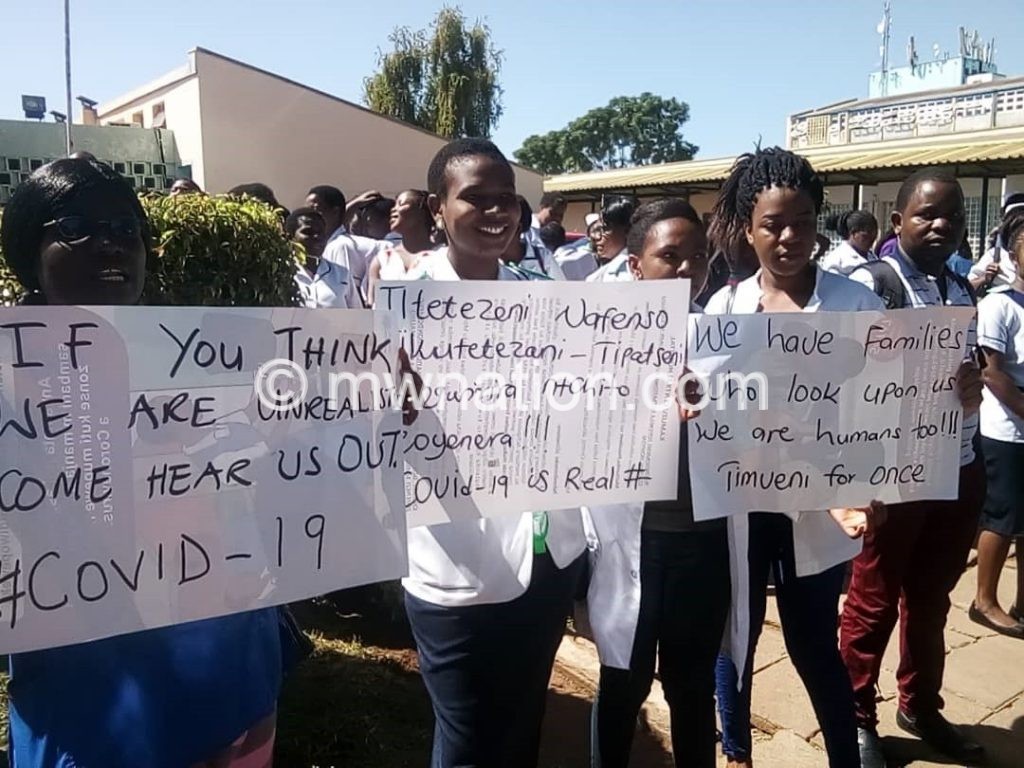Pressure mounts on govt wage bill
Mass promotions and recruitments in the civil service are piling pressure on public sector expenditure through a bloated wage bill and economic analysts fear the trend has potential to negatively impact on the economy.
In separate interviews yesterday, the commentators observed that government has been effecting recruitments and promotions out of pressure mostly emanating from some sections of the civil service through strikes.

Currently, the public sector wage bill is at K443.4 billion, representing 24.6 percent of the K1.8 trillion 2019/20 National Budget, according to the 2019/20 Mid-Year Budget Review Statement. To date, government has already spent an estimated K226.2 billion.
In a written response, Economics Association of Malawi (Ecama) president Lauryn Nyasulu said recruitments and promotions outside the planned schedule will likely increase unplanned expenditure which in turn will reduce government’s fiscal space.
She said: “An increase in such unplanned expenditure also necessitates increased borrowing which may have a negative impact on the country’s economic growth trajectory.
“The move will definitely also affect the recruitment plans. What is critical here is for government to better manage the already increased wage bill.”
But Nyasulu observed that the recent recruitment of about 2 000 health workers to enhance the frontline response to the novel coronavirus (Covid-19) pandemic was an exceptional case as it is not political but meant to save lives.
However, she said decisions on recruitment or promotion should transcend politics of the presidency because the civil service is the engine of any government administration.
In a separate telephone interview, Ben Kaluwa, an economics professor at Chancellor College—a constituent college of the University of Malawi, said both the promotions and recruitments are piling pressure on the recurrent budget and “ballooning” pensions for the civil service.
He said: “The cost implications are quite clear that it is putting pressure on the expenditure budget. It will also definitely affect recruitment plans as the pensions keep on going higher. A lot of areas are also expected to suffer because these are not strategic decisions that are being made.”
With campaigning for the July 2 fresh presidential election in motion, Kalua said the effects of the promotions and recruitments will likely have serious implications on the next government.
He observed that there are some non-productive government ministries, departments and agencies not deserving new recruitments.
Since April this year, government has recruited health workers and effected mass promotions at the Malawi Prison Service (MPS) and Department of Immigration and Citizenship Services, among others.
Currently, 110 junior police officers who upgraded themselves to first degree level have also petitioned acting Inspector General of the Malawi Police Service (MPS) Duncan Mwapasa, demanding promotions and salaries corresponding to their respective grades.
In the run-up to the disputed May 21 2019 Tripartite Elections, government also collectively promoted about 18 000 teachers and police officers.
Reacting to the concerns in an interview yesterday, Ministry of Finance, Economic Planning and Development spokesperson Williams Banda acknowledged the potential effects of the promotions and recruitments.
But he said government will engage various stakeholders to see how best they can address such a challenge.
Said Banda: “We can agree that the more recruitments and promotions will have an effect on the public sector wage bill and the national budget.
“But we will need to do thorough engagements and do some analysis to see how best we can do with such a challenge and at the same time address the welfare of all civil servants and Malawians in general.”
Meanwhile, on May 7 the Civil Servants Trade Union (CSTU) also gave government 21 days to promote civil servants who have remained in one grade for over six years or risk an industrial action.
CSTU’s position comes against the background of President Peter Mutharika’s promise last year that government would promote the affected civil servants.
The civil service, including security agencies, teachers and nurses, comprises 170 000 employees and an estimated 6 000 have worked for over 10 years without promotion. The mainstream civil service has a 40 percent vacancy rate.
The International Monetary Fund (IMF) has previously cautioned the Malawi Government to manage its wage bill to avoid exceeding the threshold of 25 percent of the total budget.
In the 2018/19 financial year, the wage bill represented about 20 percent of the IMF’s nominal goals in terms of size towards the Extended Credit Facility programme targets. At the time, the IMF recommended that new recruitment would be limited to essential staff.





